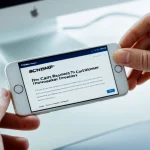Leveraging IoT for Marketing Personalization in the UK
The Internet of Things (IoT) is transforming marketing personalization by providing UK businesses with real-time, granular data. This data enables companies to understand customer preferences and behaviors more deeply than ever. By connecting devices and collecting actionable insights, IoT facilitates precise targeting, increasing engagement and conversion rates.
UK businesses can leverage IoT for marketing personalization through several actionable methods. For instance, retailers can use smart shelves and connected devices to track in-store customer interactions, tailoring promotions instantly. Similarly, IoT-enabled wearables can offer health and lifestyle data, allowing personalized offers in sectors like fitness and wellness. Additionally, IoT supports location-based marketing by detecting customer proximity and delivering contextually relevant messages.
Have you seen this : How can UK businesses improve customer loyalty through digital transformation?
Current adoption trends show rising interest among UK companies, especially in retail, hospitality, and automotive industries. Many are investing in IoT-driven tools to enhance customer journeys and improve satisfaction. However, challenges like data privacy concerns and integration complexity remain hurdles. Addressing these through transparent policies and robust technology can accelerate IoT adoption and maximize its benefits for marketing personalization in the UK.
Real-World Applications and Case Studies
Delving into IoT case studies reveals how UK businesses harness connected technologies to enhance performance across multiple industry sectors. For example, retail companies use IoT-enabled sensors and data analytics to deliver personalized marketing campaigns, increasing customer engagement and driving sales. These firms analyze real-time shopping behaviors to tailor promotions, achieving measurable uplifts in conversion rates.
Also read : What innovative computing tools are UK marketers adopting?
In the automotive sector, IoT facilitates predictive maintenance and vehicle telemetry, reducing downtime and improving fleet management efficiency. Hospitality businesses adopt IoT solutions to create smarter environments, using sensors to adjust lighting, heating, and even customize guest experiences based on preferences stored in the cloud.
Practical uses extend beyond theory—with each sector demonstrating unique benefits. UK business examples consistently highlight how IoT deployments lead to cost reductions, operational improvements, and enhanced customer satisfaction. Lessons from these applications underscore the importance of robust data security and seamless integration with legacy systems.
By exploring these industry sectors and their outcomes, companies can draw inspiration for their own IoT journeys, understanding both challenges and tangible advantages in real-world contexts.
Strategies and Tools for Implementation
When embracing IoT strategies in the UK market, selecting the right tools is crucial. Leading IoT platforms such as AWS IoT and Microsoft Azure IoT offer comprehensive capabilities tailored for integration with marketing technologies. These platforms enable data collection from connected devices, which fuels personalization tools that enhance customer experiences.
Integrating IoT with existing marketing systems requires a clear step-by-step approach. Begin by assessing current infrastructure and identifying data flows. Next, implement APIs to ensure seamless communication between IoT devices and marketing software. This integration enables marketers to utilize real-time insights for finely tuned campaigns, improving engagement and conversion rates.
Collaboration plays a critical role in successful implementation. Partnering with experienced vendors specializing in IoT solutions can ease challenges and provide expert guidance. These partnerships help customize solutions for compliance with UK regulations and market demands, enabling more effective deployment of IoT-driven marketing technology.
By combining robust IoT platforms, strategic integration steps, and strong vendor relationships, businesses can harness the full potential of IoT strategies to deliver compelling, personalized marketing initiatives in the UK.
Benefits of IoT-Driven Personalization
Personalization powered by IoT offers unprecedented access to real-time customer insights. Connected devices continuously gather detailed data, allowing marketers to understand individual preferences and behaviors more deeply than ever before. This granular information is the foundation of truly data-driven marketing strategies that resonate personally with audiences.
With such rich datasets, marketers can design highly targeted campaigns tailored to unique user needs and contexts. These campaigns move beyond generic messaging to speak directly to what matters most to each customer, enhancing relevance and appeal. The result is clear: improved campaign effectiveness, reflected in higher engagement and conversion rates.
For example, a smart home device user might receive promotions aligned precisely with their usage patterns and lifestyle, increasing the likelihood of a positive response. Furthermore, IoT data enables continuous refinement of marketing approaches based on ongoing customer activity, driving sustained improvements.
By leveraging customer insights extracted from IoT devices, businesses can craft personalized marketing tactics that not only attract attention but also build lasting relationships grounded in customer satisfaction and loyalty. This is a game changer for companies aiming to optimize every interaction.
Data Privacy, Security, and UK Compliance
Balancing data privacy and IoT security is critical for marketers leveraging connected devices. Within the UK, adherence to GDPR and related UK regulations is non-negotiable. GDPR mandates clear consent collection, data minimisation, and strict processing guidelines that apply especially to IoT devices collecting consumer data. Failure to comply risks heavy penalties and loss of customer trust.
To meet these demands, businesses should adopt robust security measures such as end-to-end encryption, regular vulnerability assessments, and secure firmware updates. These practices protect devices from cyber threats and unauthorized access, which are common risks in IoT environments. Equally important is documenting data flows and processing activities to demonstrate compliance in audits or investigations.
Transparency with customers enhances trust. Organizations must clearly communicate how data is collected, stored, and used, giving customers control over their information. Transparent privacy policies that reflect GDPR requirements bolster compliance and foster a positive reputation. Emphasizing compliance not only avoids legal issues but also creates a foundation for customer loyalty in the increasingly connected marketing landscape.



